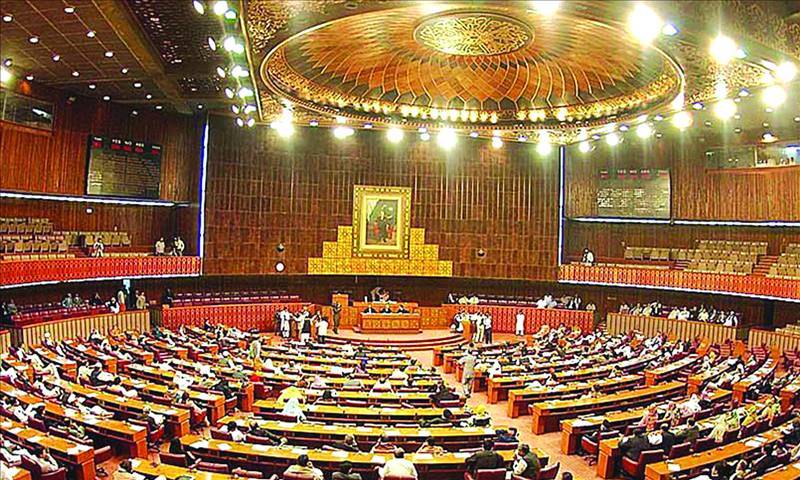
Just when the world was celebrating International Day of Democracy on September 15 as an occasion for countries to take stock of the status of internal democracy and consider ways to improve it, the PTI government in Pakistan introduced a bill seeking to punish criticism of the armed forces. As the bill has been moved by a legislator of the party in power the so called private member bill is not really so private.
The bill in the name of stopping ‘ridicule’ of the armed forces was taken up as a supplementary agenda item on Tuesday, September 15. It appears it was done deliberately to ridicule the International Day of Democracy by those who have always held democracy in contempt.
Anyone who “brings into disrepute or defames the armed forces or a member” shall be guilty of an offence punishable with imprisonment of up to two years or with fine up to half a million rupees, it says.
A corner stone of democracy is freedom of expression, which is enshrined in Article 19 - both of the Universal Declaration of Human Rights as well as the Constitution of Pakistan.
Article 19 of the Constitution stipulates “reasonable restrictions impose by law” in the interest of “glory of Islam, integrity, security or defence of Pakistan” while exercising the right to freedom of expression.
However, the term ‘security of Pakistan’ has been defined in queer ways to make a large number of subjects a taboo. Recently a journalist in Quetta was hauled and had to spend time in jail for posting a comment on his face book about a security agency charging private coal mine owners for the security provided to them. He was rescued only by parliamentary intervention but not before he had been thoroughly grilled.
The latest bill goes, not merely a step, but miles further in criminalising anything that might be construed as bringing into disrepute “a member of the armed forces.” This is too far from the ‘defence and security of Pakistan.’ It amounts to giving blanket immunity from any criticism of an officer of the armed forces regardless of the merits.
Seeking to cover up everything under the rubric of national security has always been problematic. Access to information, now a fundamental right under the 18th Amendment, has often been denied in its name. The Right to Information (RTI) law promulgated in 2017 sought to address it by relying on Johannesburg Principles adopted in 1993. Relying on these principles, the RTI Act categorically lays down “information pertaining to allegations of corruption and violation of human rights” shall not be withheld on grounds of “national security.”
However, the RTI is also defied by the powerful. The present writer asked questions about the retirement benefits and other perks and privileges of senior officers of the armed forces and also about the footage of CCTV cameras at the public place in Islamabad from where journalist Matiuallah Jan was kidnapped in July last. No answers were provided by the relevant ministries and the matter now is before the Information Commission of Pakistan.
It is hard to imagine a citizen of Pakistan deliberately bringing into contempt the armed forces of the country. People have held the armed forces in high esteem for whatever they do for the defence of the motherland, their primary duty and responsibility. They have earned the admiration of the people also whenever called to assist the civil forces in rescuing victims during national disasters like floods and earthquakes. Who will not shower praise on those laying down their lives for the defence of the country be they members of armed forces, police, any other law enforcing agency or even ordinary citizens not directly responsible for the maintenance of peace and law and order?
The problem arises when ambitious bonaparts are clearly seen to be conspiring against the constitution, the parliament and the political parties. Who can deny their meddling in politics and making and breaking of political parties?

Did former ISI chief Hamid Gul not admit it publicly? Did the Supreme Court not ask for bringing to book all those involved in stealing public funds and doling it out among political parties to keep a certain political party our to power? More recently, did the apex court not give a stinging verdict about the role of security agencies in the Faizabad dharna case? Did the special court set up under Article 6 not sentence a former army chief to death exactly for these crimes? Will then questions raised about these be construed as ridiculing armed forces?
Or take corruption? Can it be claimed with an iota of honesty that there is no corruption in the armed forces? Are they not part of the same society, large section of which are accused to be reeking with corruption?
The armed forces run a host of industrial, commercial, construction and real estate enterprises. DHAs are the country’s largest real estate enterprise, Fauji Foundation the country’s largest industrial commercial conglomerate, FWO the largest contractor and NLC on way to becoming the largest mass transporter. Will pointing out corruption in any of these enterprises be seen as ridiculing the armed forces? The recent case of a special assistant to PM, a former army officer, is instructive. Can the PM’s ‘satisfaction’ with his bare two liner explanation stop the tongues from wagging? Is equating “any member” in the proposed legislation with armed forces intended to forestall any criticism of the individual?
The armed forces will earn the respect of the people only when they learn to work within their constitutionally laid down parameters, when they willingly submit themselves to accountability at least in all their industrial and commercial enterprises.
Neither intolerance nor threats nor legislation can stop the people from questioning what has to be questioned. It must not, it will not.
The writer is a former senator
The bill in the name of stopping ‘ridicule’ of the armed forces was taken up as a supplementary agenda item on Tuesday, September 15. It appears it was done deliberately to ridicule the International Day of Democracy by those who have always held democracy in contempt.
Anyone who “brings into disrepute or defames the armed forces or a member” shall be guilty of an offence punishable with imprisonment of up to two years or with fine up to half a million rupees, it says.
A corner stone of democracy is freedom of expression, which is enshrined in Article 19 - both of the Universal Declaration of Human Rights as well as the Constitution of Pakistan.
Article 19 of the Constitution stipulates “reasonable restrictions impose by law” in the interest of “glory of Islam, integrity, security or defence of Pakistan” while exercising the right to freedom of expression.
However, the term ‘security of Pakistan’ has been defined in queer ways to make a large number of subjects a taboo. Recently a journalist in Quetta was hauled and had to spend time in jail for posting a comment on his face book about a security agency charging private coal mine owners for the security provided to them. He was rescued only by parliamentary intervention but not before he had been thoroughly grilled.
The latest bill goes, not merely a step, but miles further in criminalising anything that might be construed as bringing into disrepute “a member of the armed forces.” This is too far from the ‘defence and security of Pakistan.’ It amounts to giving blanket immunity from any criticism of an officer of the armed forces regardless of the merits.
Seeking to cover up everything under the rubric of national security has always been problematic. Access to information, now a fundamental right under the 18th Amendment, has often been denied in its name. The Right to Information (RTI) law promulgated in 2017 sought to address it by relying on Johannesburg Principles adopted in 1993. Relying on these principles, the RTI Act categorically lays down “information pertaining to allegations of corruption and violation of human rights” shall not be withheld on grounds of “national security.”
However, the RTI is also defied by the powerful. The present writer asked questions about the retirement benefits and other perks and privileges of senior officers of the armed forces and also about the footage of CCTV cameras at the public place in Islamabad from where journalist Matiuallah Jan was kidnapped in July last. No answers were provided by the relevant ministries and the matter now is before the Information Commission of Pakistan.
The term ‘security of Pakistan’ has been defined in queer ways to make a large number of subjects taboo
It is hard to imagine a citizen of Pakistan deliberately bringing into contempt the armed forces of the country. People have held the armed forces in high esteem for whatever they do for the defence of the motherland, their primary duty and responsibility. They have earned the admiration of the people also whenever called to assist the civil forces in rescuing victims during national disasters like floods and earthquakes. Who will not shower praise on those laying down their lives for the defence of the country be they members of armed forces, police, any other law enforcing agency or even ordinary citizens not directly responsible for the maintenance of peace and law and order?
The problem arises when ambitious bonaparts are clearly seen to be conspiring against the constitution, the parliament and the political parties. Who can deny their meddling in politics and making and breaking of political parties?

Did former ISI chief Hamid Gul not admit it publicly? Did the Supreme Court not ask for bringing to book all those involved in stealing public funds and doling it out among political parties to keep a certain political party our to power? More recently, did the apex court not give a stinging verdict about the role of security agencies in the Faizabad dharna case? Did the special court set up under Article 6 not sentence a former army chief to death exactly for these crimes? Will then questions raised about these be construed as ridiculing armed forces?
Or take corruption? Can it be claimed with an iota of honesty that there is no corruption in the armed forces? Are they not part of the same society, large section of which are accused to be reeking with corruption?
The armed forces run a host of industrial, commercial, construction and real estate enterprises. DHAs are the country’s largest real estate enterprise, Fauji Foundation the country’s largest industrial commercial conglomerate, FWO the largest contractor and NLC on way to becoming the largest mass transporter. Will pointing out corruption in any of these enterprises be seen as ridiculing the armed forces? The recent case of a special assistant to PM, a former army officer, is instructive. Can the PM’s ‘satisfaction’ with his bare two liner explanation stop the tongues from wagging? Is equating “any member” in the proposed legislation with armed forces intended to forestall any criticism of the individual?
The armed forces will earn the respect of the people only when they learn to work within their constitutionally laid down parameters, when they willingly submit themselves to accountability at least in all their industrial and commercial enterprises.
Neither intolerance nor threats nor legislation can stop the people from questioning what has to be questioned. It must not, it will not.
The writer is a former senator

